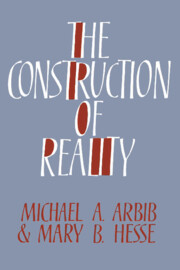Book contents
- Frontmatter
- Contents
- Preface
- Chapter 1 Posing the problem
- Chapter 2 The intelligence of the artificial
- Chapter 3 Schema theory
- Chapter 4 Relating mind and brain
- Chapter 5 Freedom
- Chapter 6 Freud on psychology and religion
- Chapter 7 Schemas: from the individual to the social
- Chapter 8 Language, metaphor, and a new epistemology
- Chapter 9 Interpretation and reality
- Chapter 10 Religions as social schemas
- Chapter 11 The Great Schema
- Chapter 12 Secular schemas
- References
- Author index
- Subject index
Chapter 1 - Posing the problem
Published online by Cambridge University Press: 22 September 2009
- Frontmatter
- Contents
- Preface
- Chapter 1 Posing the problem
- Chapter 2 The intelligence of the artificial
- Chapter 3 Schema theory
- Chapter 4 Relating mind and brain
- Chapter 5 Freedom
- Chapter 6 Freud on psychology and religion
- Chapter 7 Schemas: from the individual to the social
- Chapter 8 Language, metaphor, and a new epistemology
- Chapter 9 Interpretation and reality
- Chapter 10 Religions as social schemas
- Chapter 11 The Great Schema
- Chapter 12 Secular schemas
- References
- Author index
- Subject index
Summary
Lord Gifford's brief
“I wish the lecturers to treat their subject as a strictly natural science, the greatest of all possible sciences, indeed, in one sense, the only science, that of Infinite Being, without reference to or reliance upon any supposed special exceptional or so-called miraculous revelation. I wish it considered just as astronomy or chemistry is.”
This is Lord Gifford's statement in the deed of foundation of his lectures in 1885. Much water has flowed under the bridge since then, and we can no longer take for granted either the character of “natural science” or of “revelation” in the sense in which these concepts were understood in Gifford's time. We therefore make no excuse (and believe it to be within the spirit of his foundation) that this book concentrates on the problem of what it is to be a “science,” and what kind of continuity, if any, exists between the knowledge of “nature,” of “persons,” or of “society,” and the possibility of knowledge of God.
We speak of “knowledge,” but our difficulty today in addressing Lord Gifford's brief is that the theory of knowledge (epistemology) has come to mean almost exclusively the methodology of the natural sciences and, more recently and belatedly, the social sciences, to the exclusion of any possibility of knowing extraspatiotemporal reality, if such can be said to exist. Our culture leads us to believe in a natural space–time reality that is explored and increasingly discovered to us in natural science.
- Type
- Chapter
- Information
- The Construction of Reality , pp. 1 - 23Publisher: Cambridge University PressPrint publication year: 1986

